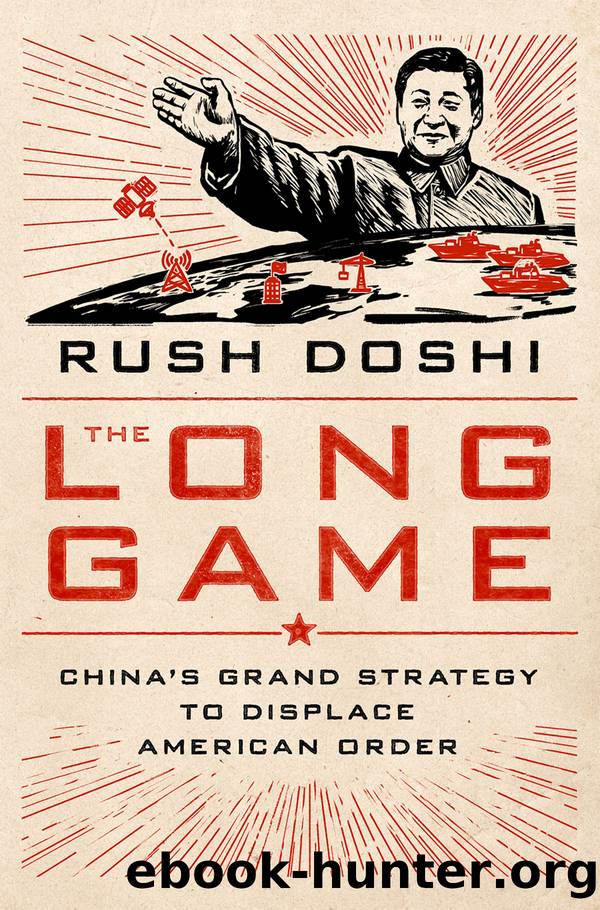The Long Game: China's Grand Strategy to Displace American Order by Rush Doshi

Author:Rush Doshi [Doshi, Rush]
Language: eng
Format: epub
ISBN: 9780197527917
Google: K4k4EAAAQBAJ
Publisher: Oxford University Press
Published: 2021-06-25T00:29:21.819552+00:00
Building Order
AIIB offers several benefits for Chinaâs order-building strategy. It (1) provides China coercive ability to constrain its neighbors; (2) helps China set rules and strike consensual bargains; and (3) provides China legitimacy.
First, AIIB institutionalizes Chinaâs coercive capacity, providing it some plausible deniability when it is exercised and reducing some of the friction otherwise generated by its nakedly unilateral use. Chinaâs control over AIIBâs membership, veto, and bank staffâand the relative autonomy of the staff and president over loan disbursementsâcreates the possibility for economic statecraft. And if AIIB adopts some forms of conditionality, either explicit or implicit, that involve criteria in line with Chinaâs own political or economic preferences, it would constrain autonomy for Asiaâs developing states and increase the likelihood that they might align their foreign policies more closely to Chinaâs in order to access capital. Indeed, some Chinese officials and scholars privately suggest that countries with disputes with China will be less likely to access funds from AIIB.73 Others have observed the dichotomy between a growing âeconomic dependence on China and a security reliance on the United Statesâ and argued that economic inducements will enhance Chinaâs freedom of maneuver.74
China has previously wielded its influence in multilateral organizations against others. For example, it refused to approve the ADBâs multilateral development plan for India because some funds would be used in Arunachal Pradesh, which China claims.75 AIIB also offers opportunities for giving others important roles within Chinese order. Already, the decisions regarding which countries hold AIIB vice presidencies is assumed to be linked to Chinaâs political interests. South Korea was promised one of AIIBâs vice presidencies because of its early support for AIIB, but it lost that slot to France in a decision linked to Seoulâs deployment of US missile defense systems.â76 China privately offered Australia a senior role in AIIB if it signed the October 2014 MOU, but then retracted that offer when Australiaâs hesitance was perceived as flowing from US and Japanese pressure.77 And even when AIIB is not used in this way, it can still help build economic flows that would tie Asian neighbors to Chinaâs own economy and create coercive capacity in the future. Writing on these motivations, Fudan University Professor and former Chinese diplomat Ren Xiao argues that âgeo-economics and geopolitics are constantly workingâ together, that âit is not true that China is simply altruistic,â and that through AIIB China believes it can âwin friends and influence in the regionâ and âmake nearby countries more attractive as suppliers to Chinese manufacturers and as consumers of Chinese-made goods.â78 Finally, the rules and standard-setting power AIIB generates can affect the fates of Asian economies. Australian officials were concerned that AIIBâs draft guidelines did not seem to reference coal technology, and requirements regulating who might participate in lucrative infrastructure projects also offer China constraining power over its neighbors.79 Just as Japan and the United States used development banks to advance political goals, so too can China.
Second, AIIB provides a foundation not only for coercion but for consensual order-building.
Download
This site does not store any files on its server. We only index and link to content provided by other sites. Please contact the content providers to delete copyright contents if any and email us, we'll remove relevant links or contents immediately.
Zero to IPO: Over $1 Trillion of Actionable Advice from the World's Most Successful Entrepreneurs by Frederic Kerrest(4510)
Machine Learning at Scale with H2O by Gregory Keys | David Whiting(4292)
Never by Ken Follett(3937)
Harry Potter and the Goblet Of Fire by J.K. Rowling(3848)
Ogilvy on Advertising by David Ogilvy(3604)
Shadow of Night by Deborah Harkness(3357)
The Man Who Died Twice by Richard Osman(3072)
Book of Life by Deborah Harkness(2930)
The Tipping Point by Malcolm Gladwell(2911)
Will by Will Smith(2908)
0041152001443424520 .pdf by Unknown(2843)
My Brilliant Friend by Elena Ferrante(2824)
Purple Hibiscus by Chimamanda Ngozi Adichie(2822)
How Proust Can Change Your Life by Alain De Botton(2805)
How to Pay Zero Taxes, 2018 by Jeff A. Schnepper(2646)
Hooked: A Dark, Contemporary Romance (Never After Series) by Emily McIntire(2547)
Rationality by Steven Pinker(2352)
Can't Hurt Me: Master Your Mind and Defy the Odds - Clean Edition by David Goggins(2323)
Borders by unknow(2301)
